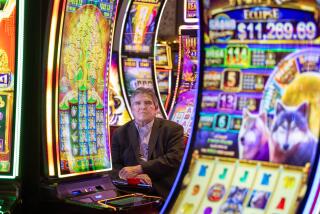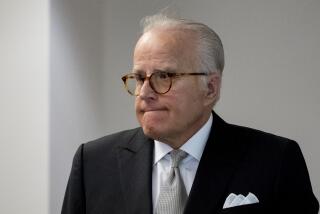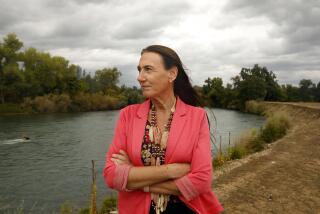Babbitt Denies Partisan Pressure Killed Casino Project
WASHINGTON — Interior Secretary Bruce Babbitt denied Thursday that partisan politics had prompted him to reject a Native American casino project in Wisconsin. But an old friend and former law partner raised questions about the secretary’s account.
“The allegations that there was improper White House or [Democratic National Committee] influence and that I was a conduit for that influence are demonstrably false,” Babbitt testified before the Senate committee investigating campaign fund-raising abuses.
On key details, however, Babbitt found himself at odds with Paul Eckstein, a close associate of 30 years who had been hired to lobby for the casino by three Wisconsin Chippewa tribes and a racetrack operator. The tribes allege that their deal was rejected because of the political clout--and campaign contributions--of tribes opposing it.
The clash came as investigators suggested that the committee’s months-long hearing process may be over. Chairman Fred Thompson (R-Tenn.) is expected soon to decide whether to continue public hearings. The inquiry officially expires at year’s end.
Babbitt and Eckstein graduated from Harvard Law School together in 1965. They studied for the bar together, joined the same Phoenix law firm and once hiked down the Grand Canyon, one behind the other.
Eckstein headed Babbitt’s 1982 gubernatorial campaign in Arizona and served on his “kitchen Cabinet.” When Babbitt ran for president in 1988, Eckstein was on the organizing committee.
But the two friends found themselves with differing recollections Thursday as they appeared one after the other before the Senate Governmental Affairs Committee.
“Either you are telling the truth or you are lying,” Sen. Pete V. Domenici (R-N.M.) told Eckstein. “Or Secretary Babbitt is telling the truth or he is lying.”
Eckstein, who testified first, said that Babbitt had told him during a meeting on July 14, 1995, that White House Deputy Chief of Staff Harold M. Ickes had pressed Babbitt to make a decision that very day on the casino.
Eckstein also said that Babbitt mentioned political contributions to the Democrats by some Native American tribes.
“There’s no doubt at all,” Eckstein said of his recollections.
Babbitt’s memory of the meeting was hazy. He insisted, however, that he had never talked to anyone at the White House about the casino but may have briefly invoked Ickes’ name with Eckstein to cut short their meeting. Babbitt said he could not recall whether campaign contributions came up during the talk.
“I have no recollection of any conversation to that effect,” Babbitt said over and over as Thompson pressed the point.
*
GOP senators produced documents showing that aides to Ickes had contacted Babbitt staff members three times to check on the status of the casino application. Former Democratic Party Chairman Donald L. Fowler has also testified that he contacted “someone at Interior” about the matter.
Behind the scenes was Patrick O’Connor, a former Democratic Party treasurer hired as a lobbyist by tribes opposing the casino.
O’Connor contacted both Ickes and Fowler in an attempt to prompt the Interior Department to reject the casino application. He also brought up the issue with President Clinton during a brief conversation at a Minneapolis reception.
The regional office of the Bureau of Indian Affairs had endorsed the casino, which was to be based at a failing dog track in Hudson, Wis. But higher-ups in Washington later turned down the application, citing broad-based community opposition and the great distance between the proposed casino and the nearest reservation.
However, the apparent high-level White House interest in the project has prompted questions about whether the decision was made on its merits.
Immediately after the decision was announced, O’Connor helped round up significant contributions to the Democratic Party from the opposing tribes. In all, the tribes gave $270,000 to the Democrats, records show.
In a briefing with reporters, Atty. Gen. Janet Reno confirmed Thursday that the Justice Department was conducting a 30-day review to determine if there is evidence of wrongdoing to warrant appointment of an independent counsel.
Babbitt, citing “clouds of unwarranted suspicion that have been raised,” said he delegated the decision to an aide, who made the ruling on the merits.
More to Read
Get the L.A. Times Politics newsletter
Deeply reported insights into legislation, politics and policy from Sacramento, Washington and beyond. In your inbox three times per week.
You may occasionally receive promotional content from the Los Angeles Times.










